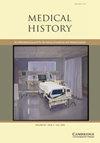Breakdown and reform: the Chilean road to the creation of ministries of hygiene and social welfare 1892–1931
IF 1.1
2区 哲学
Q4 HEALTH CARE SCIENCES & SERVICES
引用次数: 0
Abstract
Doctors have played an important role in the development of health institutions in Latin America. However, they are not the only profession that has had a voice in these matters. There are also other factors influencing the development of ministries of health. This issue has gone unnoticed in the literature. This article suggests that it is possible to identify two distinct trends in the creation of health ministries in Latin America. The first, of an early nature, was seen principally in Central America and the Caribbean in countries dependent on or under the influence of the United States which, from the 1880s, promoted health Pan-Americanism. The second trend, which became apparent from 1924, was characterised by the emergence of ministries in a context of institutional breakdown and the appearance of new actors (military or populist leaders). This second trend was first seen in Chile in 1924. This article analyses the creation of the Ministerio de Higiene, Asistencia y Previsión Social (Ministry of Hygiene, Assistance and Social Security) in Chile in 1924 and its subsequent development through to 1931. The analysis looks at the health measures adopted, the context in which this occurred and the debates triggered by the ministry’s process of institutional development, based on parliamentary discussions, presidential speeches, official statistics, legislation, documents prepared by key actors and the press of the time.崩溃与改革:1892-1931 年智利卫生和社会福利部的创建之路
医生在拉丁美洲卫生机构的发展中发挥了重要作用。然而,他们并不是在这些问题上有发言权的唯一职业。影响卫生部发展的还有其他因素。这个问题在文献中一直没有引起注意。本文认为,在拉丁美洲创建卫生部的过程中,可以发现两种截然不同的趋势。第一种趋势出现较早,主要出现在中美洲和加勒比地区依赖美国或受美国影响的国家。第二种趋势从 1924 年开始显现,其特点是在机构崩溃和新的参与者(军队或民粹主义领导人)出现的背景下出现的部委。第二种趋势于 1924 年首次出现在智利。本文分析了智利于 1924 年成立的卫生、援助和社会保障部(Ministerio de Higiene, Asistencia y Previsión Social)及其随后直至 1931 年的发展情况。文章以议会讨论、总统讲话、官方统计数据、立法、主要参与者编写的文件以及当时的新闻媒体为基础,分析了所采取的卫生措施、卫生措施的背景以及该部机构发展过程中引发的争论。
本文章由计算机程序翻译,如有差异,请以英文原文为准。
求助全文
约1分钟内获得全文
求助全文
来源期刊

Medical History
医学-科学史与科学哲学
CiteScore
1.60
自引率
0.00%
发文量
25
审稿时长
>12 weeks
期刊介绍:
Medical History is a refereed journal devoted to all aspects of the history of medicine and health, with the goal of broadening and deepening the understanding of the field, in the widest sense, by historical studies of the highest quality. It is also the journal of the European Association for the History of Medicine and Health. The membership of the Editorial Board, which includes senior members of the EAHMH, reflects the commitment to the finest international standards in refereeing of submitted papers and the reviewing of books. The journal publishes in English, but welcomes submissions from scholars for whom English is not a first language; language and copy-editing assistance will be provided wherever possible.
 求助内容:
求助内容: 应助结果提醒方式:
应助结果提醒方式:


